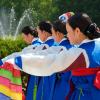
추석 ( Chuseok )
Chuseok (Korean: 추석; Hanja: 秋夕; [tɕʰu.sʌk̚], literally "autumn evening"), also known as Hangawi (Hangul: 한가위; [han.ɡa.ɥi]; from archaic Korean for "the great middle (of autumn)"), is a major mid-autumn harvest festival and a three-day holiday in South Korea celebrated on the 15th day of the 8th month of the lunar calendar on the full moon. In North Korea, they only celebrate for the day of chuseok. Like many other harvest festivals around the world, it is held around the autumn equinox, i.e. at the very end of summer or in early autumn. It is the biggest traditional holiday in South Korea.
As a celebration of the good harvest, Koreans visit their ancestral hometowns and share a feast of Korean traditional food such as songpyeon (Korean: 송편; Hanja: 松䭏), yakgwa, fruits like Asian pear and hallabong, and rice wines such as sindoju (Korean: 신도주; Hanja: 新稻酒). and dongdongju (Korean: 동동주; Hanja: 浮蟻酒). There are two major traditions related to Chuseok: Charye (Korean: 차례; Hanja: 茶禮, ancestor memorial services at home, also known as Jesa), and Seongmyo (Korean: 성묘; Hanja: 省墓, family visit to the ancestral graves), which is usually accompanied by Beolcho (Korean: 벌초; Hanja: 伐草, tidying graves, removing weeds around them). Another major custom is to prepare the family's ancestors their favorite meals as an offering.


